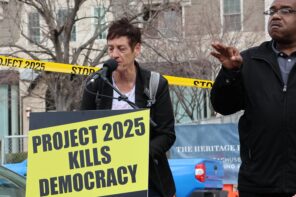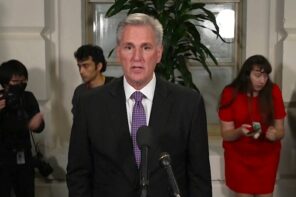Thursday, the flagship campus of the university where I teach, the University of Colorado, announced its first Visiting Scholar of Conservative Thought, part of a three-year, privately-funded pilot effort to “broaden intellectual diversity” at the school.
Similar efforts are underway elsewhere, including proposals to establish Centers for Western Civilization, new Great Books programs, and the like. Funders typically want to expand beyond their cadre of scholars at smaller universities and private colleges (such as Hillsdale) and push their ideas in the highest reaches of the academic world, at the research universities and in the Ivy League. But of course, even a cursory look at George W. Bush’s cabinet and policy advisors—from Donald Kagan, professor of classics and history at Yale, to economist Glenn Hubbard at Columbia—would suggest that there’s a deeper bench of conservative academics at the most elite institutions than commonly alleged.
Steven Hayward, currently a fellow at Ashland University in Ohio and previously a fellow with the American Enterprise Institute and Heritage Foundation, will be the first Conservative Thought Chair. He will teach four courses in political science and environmental studies.
The appointment clearly has the look of bringing in someone with well-defined op-ed positions, and Hayward has no shortage of those, as evidenced by the archive of his posts in conserva-blog Power Line.
Based on his books alone, which are mostly a compendium of op-ed positions, attacks on twentieth-century progressivism and its presidential exponents (an argument perfected recently by Glenn Beck’s screeds), and some pretty standard hagiographies of Ronald Reagan and Winston Churchill, it’s difficult to see why he would land an academic position at the flagship university of the state. But his most serious recent text, Mere Environmentalism, is of most interest here.
The text condemns the environmental movement for emphasizing nature over the supernatural, and thus displacing God and mankind’s role in managing God’s creation. The policy prescriptions, while light, are modest and within the mainstream of current environmental policy discussions (including discussions of a particular form of carbon tax). Of more significance is the inclusion of a Genesis-based Christian viewpoint into a university with one of the leading environmental studies programs in the world.
Hayward himself declares his intention to expose his students to diverse viewpoints, and not to proselytize for his own. No problem there; that is in fact standard practice in most classrooms that I’ve ever seen and most colleagues I have ever known.
What seems the bigger issue is why a flagship university would miss an opportunity to hire a scholar of conservative thought (of whatever personal viewpoint) with a range of deeply researched, carefully wrought publications—someone akin to a Robert George of Princeton, a Thomas Kidd of Baylor, or the outstanding Civil War historian Allen Guelzo.
The irony is that the hire seems a mirror-image mimicking of what conservatives typically allege of the university hiring process—that only liberals/radicals, regardless of scholarly accomplishment, need apply. The other irony: conservatives pointed to Boulder as a case study in the radicalization of academia a few years back largely by harping on Ward Churchill. But Churchill lost his position when a committee of scholars found him guilty of academic fraud. Meanwhile, the deliberately partisan fundraising behind this appointment suggests the conservative critiques were not about “academic quality,” but rather simply with getting more of their own players into the ideological game. In this tired and hackneyed vision, academia is but another version of the cable TV wars. “They” have Maddow, so we want Hannity, ad nauseam.
While the Conservative Political Action Committee meets and insists that political conservatives simply need more of the same (never mind the 2012 election), and while the nether regions of Hannity-heads and the religious right continues to maintain fantasies about the “radical” and “socialist” agenda of Barack Obama, I can’t help but maintain a hope that that the best writers and researchers among academic conservatives will use their positions to advance deeply humane arguments that get us beyond the tired talking points of the present day.
And if I may be so blunt, conservatives have a deep bench among historians to advance this cause. History is by its nature a discipline that prizes conservative values—we are conserving the past, after all. And historians instinctively bring a Burkean sense of how the past shapes the present and cannot simply be discarded for whatever the favored political nostrum of the day happens to be.
For example, it’s easy enough to write a history of American environmentalism from within the framework of religious history, and the current vogue of “Creation Care” among Christian environmentalists draws in part on that tradition. Further, it was conservatives of the Theodore Roosevelt ilk, together with early visionaries such as John Muir, who created the twentieth-century environmentalist movement.
The history of conservatism in America has been one of the “hottest” topics in my field of American history over the last twenty years or more. Somehow, that development has evaded media coverage, and I have yet to see any of those scholars trumpeted on the right-leaning shows and networks. Perhaps our newly endowed Professor Hayward will invite some of them to campus, where they might have a discussion of what (if anything) contemporary conservatives take from their own intellectual antecedents.




